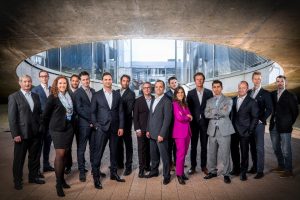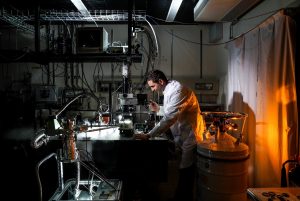Branch
Select your branch
Innovator of the Month Interview with LakeDiamond
LakeDiamond, a Swiss start-up led by Pascal Gallo, is leading the way for lab-grown ultra-pure diamonds. Their synthetic diamonds have numerous potential technological applications, beyond jewellery. Their custom-developed Micro-Wave Chemical Vapor Deposition reactors grow the highest quality diamond on earth, mono-crystals up to the centimetre in scale. The Ecole Polytechnique Fédérale de Lausanne (EPFL) spin-off is currently undergoing an Initial Coin Offering (ICO) to raise 60 million CHF, to expand its production capabilities to meet high market demand.
Hello Pascal, can you tell us a bit about your story. When did you envision that you could build a start-up based on the growth of diamonds?
It all started during my post-doc at EPFL where I was investigating ways to enhance laser power. One day, along with the lab leader, Eli Kapon, we realized that by putting diamonds in lasers we could dramatically enhance their power. Although the potential of this idea was great, we were missing the first raw material: extremely pure diamonds. It was at that point that we decided to
create them; it took us about 10 years of development to come up with a reactor in its industrial version suited to the mass production of diamonds, especially for photonic applications. Once we had the opportunity to grow diamonds, we realized that we could address several other applications beyond lasers.

Was the shift beyond laser applications a turning point for you, or is it still a core goal of LakeDiamond?
The main project within LakeDiamond is still focused on lasers, but we have started to diversify the applications. Behind each application there is a collaboration with a different research group at EPFL. For example, we are working on the development of micro mechanical gears for the watch industry. Also, as this may be the first association you make with a diamond, we grow some for jewellery applications, which are quite successful with millennials: the younger generations appreciate our sustainable production methods. A third application involves transistors. For the latter, we are collaborating with Prof. Elison Matioli (POWERlab). Finally, we are investing in the use of diamonds in quantum physics: due to the nitrogen vacancy centers in diamonds we can
actually measure extremely weak magnetic fields. With this power, we could do
cardiomagnetometry and brain imaging with sensitivities comparable to the best devices in the world and at a fraction of the cost.
LakeDiamond has now moved on from being just a start-up and for each new application we are creating small spinoffs with dedicated industrial partners. Currently we count partnerships for the more stable applications: laser drone industry, watches and jewellery. For the more scientific and technical applications (i.e. transistors and magnetic sensors), we are still in the research phase.
You are among the very first companies doing an ICO in Switzerland; can you tell us something about your experience?
Organizing an ICO is not straightforward. It is like organizing a small Initial Public Offering (IPO), especially in terms of budget and legal framework. However, the principle is completely different.
The main difference is ICO’s democratization, which is achieved by giving access to a much broader public. We are making a token representing one minute of production, which you can directly use to grow diamonds. Otherwise, you can use your token to have diamonds grown for a certain party, who will pay you for using your production time. It is like a cryptocurrency linked to our production time and it finances our production capacity and our research and development. I would say we’re being quite successful because we are distributed by Swissquote, a Swiss bank. This allows us to address normal people, even those who are not aware that cryptocurrency exists or how it works. You just log onto the Swissquote website and purchase our token as if it was a traditional share.
I would like to mention that organizing an ICO is very expensive, especially the legal framework. We would be very happy to share our business model with other start-ups that would also like to organize an ICO. We will share our knowledge free of charge because we think that it is a great way to raise money. The underlying technology is there. It’s an ERC20 token, based on Ethereum.

You announced a plan to keep the whole production in the Lausanne area. How important is this to you?
Maintaining production in Switzerland is actually cost favorable for us. The stability of the local infrastructure is key to successfully grow diamonds, which can take up to a month. We purchase our electricity from Romande Energie, that was produced from renewable resources.
Another good point for remaining in Switzerland is given by the proximity to EPFL where we collaborate with five research groups.
Furthermore, the global Swiss environment is really good for start-ups. First of all, you have access to a lot of investors, which is mainly my job, and this is a major plus when financing your start-up. In addition, being a start-up gives you economical and financial benefits. For example, we have a tax holiday, meaning that we don’t pay any taxes for five years with the possibility to extend this for another five years (see Service de la promotion de l’économie et de l’innovation du Canton de Vaud).
What about the early stages, maybe before even thinking of investors, were there people that helped you establish a good team?
It is very important to find someone knowledgeable in law, corporate law and finance, with a good track record in the industry. I was very lucky to meet my main associate Theopile Mounier (Chief Financial Officer) at a very early stage. I met him by chance, like most of my team actually; networking can help you a lot. I met my first investor on a plane. You need to pitch all the time. You never know who could be your next investor or associate!

